-
 Bitcoin
Bitcoin $85,053.4987
0.47% -
 Ethereum
Ethereum $1,604.0688
1.50% -
 Tether USDt
Tether USDt $0.9997
-0.01% -
 XRP
XRP $2.0888
1.22% -
 BNB
BNB $593.1504
0.71% -
 Solana
Solana $138.4195
3.26% -
 USDC
USDC $0.9999
-0.01% -
 Dogecoin
Dogecoin $0.1597
3.11% -
 TRON
TRON $0.2415
-1.60% -
 Cardano
Cardano $0.6329
3.08% -
 UNUS SED LEO
UNUS SED LEO $9.2888
0.62% -
 Chainlink
Chainlink $12.7878
1.44% -
 Avalanche
Avalanche $19.2917
1.31% -
 Stellar
Stellar $0.2447
1.18% -
 Toncoin
Toncoin $3.0011
0.71% -
 Shiba Inu
Shiba Inu $0.0...01226
3.89% -
 Hedera
Hedera $0.1676
2.05% -
 Sui
Sui $2.1459
1.63% -
 Bitcoin Cash
Bitcoin Cash $337.7604
2.53% -
 Hyperliquid
Hyperliquid $17.6730
4.32% -
 Polkadot
Polkadot $3.7299
1.72% -
 Litecoin
Litecoin $76.5325
1.77% -
 Dai
Dai $0.9999
0.00% -
 Bitget Token
Bitget Token $4.4634
2.38% -
 Ethena USDe
Ethena USDe $0.9991
0.00% -
 Pi
Pi $0.6486
5.66% -
 Monero
Monero $212.3459
-1.60% -
 Uniswap
Uniswap $5.2591
1.62% -
 Pepe
Pepe $0.0...07316
3.79% -
 OKB
OKB $50.8354
2.04%
How do NFT Legal Frameworks regulate the ownership and transactions of NFTs?
NFT ownership and transactions are governed by a mix of blockchain rules, smart contracts, and evolving legal frameworks, with significant jurisdictional variations impacting intellectual property rights and dispute resolution.
Mar 07, 2025 at 03:55 am

Key Points:
- NFT ownership is largely determined by the underlying blockchain's rules and the smart contract governing the specific NFT. Legal frameworks are still evolving to address the unique aspects of NFTs.
- NFT transactions are generally governed by contract law, but existing laws may need interpretation or adaptation to fully encompass the digital nature of NFTs.
- Jurisdictional differences significantly impact how NFT ownership and transactions are legally treated.
- Intellectual property rights associated with NFTs are a complex area, with ongoing debate about ownership of the underlying asset versus ownership of the NFT itself.
- Regulatory bodies worldwide are actively exploring how to best regulate NFTs, aiming for clarity and consumer protection.
How do NFT Legal Frameworks regulate the ownership and transactions of NFTs?
The legal landscape surrounding Non-Fungible Tokens (NFTs) is still nascent and evolving. There's no single, universally accepted legal framework. Instead, existing laws and regulations are being applied and interpreted to address the novel aspects of NFT ownership and trading. This creates a complex situation with significant jurisdictional variations.
Ownership of NFTs:
The ownership of an NFT is primarily determined by the blockchain technology it resides on and the specific smart contract governing its creation and transfer. The blockchain acts as a public ledger, recording all transactions and providing a verifiable record of ownership. This decentralized aspect distinguishes NFT ownership from traditional property rights.
However, legal systems grapple with defining this digital ownership. While a blockchain entry shows who holds the NFT, it doesn't always definitively establish what rights that ownership entails. For example, does ownership of an NFT grant exclusive rights to the underlying artwork or intellectual property? This is a key area of ongoing legal debate.
Transactions Involving NFTs:
NFT transactions are largely governed by contract law. The terms and conditions of a sale, including price, delivery, and warranties, are usually defined within the smart contract or in a separate agreement between buyer and seller. The enforceability of these contracts depends on the jurisdiction and the specific details of the agreement.
Traditional contract law principles apply, including concepts like offer, acceptance, consideration, and capacity. However, the decentralized and immutable nature of blockchain transactions presents unique challenges for traditional legal processes. Dispute resolution may involve both online and offline legal mechanisms.
Jurisdictional Differences:
The legal treatment of NFTs varies significantly across different jurisdictions. Some countries are more proactive in developing specific NFT regulations, while others are taking a wait-and-see approach. This jurisdictional ambiguity creates uncertainty for both NFT creators and users.
For instance, the legal recognition of NFTs as property, the tax implications of NFT transactions, and the enforcement of intellectual property rights associated with NFTs can differ substantially across countries. International transactions further complicate the legal landscape.
Intellectual Property Rights and NFTs:
A crucial aspect of NFT legality revolves around intellectual property (IP) rights. Often, an NFT grants ownership of a digital asset, but the underlying IP rights might be separately owned. This can lead to complex legal issues, particularly concerning copyright, trademarks, and patents.
For example, buying an NFT of a digital artwork doesn't automatically grant the buyer the right to reproduce, distribute, or modify that artwork. The original artist retains those rights unless explicitly transferred. The legal clarification of these rights is crucial for the sustainable development of the NFT market.
Regulatory Scrutiny and Future Directions:
Regulatory bodies worldwide are increasingly focusing on the NFT space. Their primary concerns include consumer protection, preventing fraud, and addressing potential tax evasion. We are likely to see more regulatory frameworks emerge in the coming years.
These frameworks may involve clearer definitions of NFT ownership, guidelines for NFT marketplaces, and regulations surrounding the use of NFTs in various sectors. The goal is to create a more transparent and secure environment for NFT transactions while fostering innovation.
Common Questions and Answers:
Q: Does owning an NFT mean I own the copyright to the underlying asset?
A: Not necessarily. Owning an NFT typically grants ownership of the digital token representing the asset, not necessarily the copyright or other intellectual property rights associated with that asset. These rights are usually separately owned and must be explicitly transferred.
Q: What happens if there's a dispute over an NFT transaction?
A: Dispute resolution can involve a variety of methods, including mediation, arbitration, or litigation in relevant jurisdictions. The enforceability of any legal action will depend on the jurisdiction, the terms of the underlying smart contract, and applicable laws.
Q: Are NFTs taxed differently than other assets?
A: The tax implications of NFTs vary significantly based on jurisdiction and the specific circumstances of the transaction. Capital gains taxes, sales taxes, and other taxes might apply, depending on factors such as the nature of the asset, the purpose of the transaction, and the duration of ownership.
Q: What are the risks associated with investing in NFTs?
A: The NFT market is highly volatile, and there are significant risks associated with investing in NFTs. These include the risk of fraud, scams, and market fluctuations. It's crucial to conduct thorough due diligence before investing in any NFT. Furthermore, the lack of clear legal frameworks in many jurisdictions adds to the inherent risks.
Q: How are NFT marketplaces regulated?
A: Regulation of NFT marketplaces is still evolving. Some jurisdictions are starting to implement regulations to ensure compliance with anti-money laundering (AML) and know-your-customer (KYC) rules, as well as consumer protection laws. However, a comprehensive and consistent regulatory approach across different jurisdictions is yet to be fully established.
Disclaimer:info@kdj.com
The information provided is not trading advice. kdj.com does not assume any responsibility for any investments made based on the information provided in this article. Cryptocurrencies are highly volatile and it is highly recommended that you invest with caution after thorough research!
If you believe that the content used on this website infringes your copyright, please contact us immediately (info@kdj.com) and we will delete it promptly.
- Ripple's XRP price has held on well despite recent market volatility
- 2025-04-19 13:20:13
- With a SHIB burn of nearly 28 billion tokens in a day
- 2025-04-19 13:20:13
- Bitcoin's value has transformed dramatically since its creation, rising from $0.08 in 2010 to an all-time high of $69,000 in 2021.
- 2025-04-19 13:15:13
- Ethereum Whales Have Been Accumulating ETH at a Stash Rate, Pointing to an Impending Price Rally
- 2025-04-19 13:15:13
- This weekend's best sweepstakes casino promos include our favorite providers
- 2025-04-19 13:10:13
- A volatile trading session looms as $2.02 billion in Bitcoin [BTC] options and $280 million in Ethereum [ETH] options are set to expire today.
- 2025-04-19 13:10:13
Related knowledge
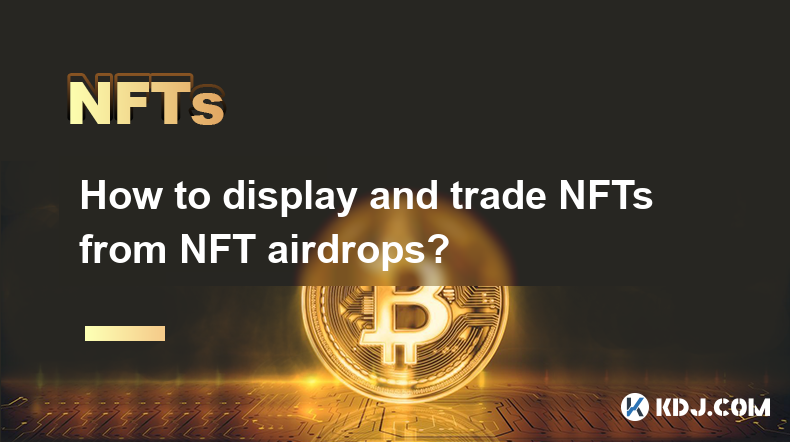
How to display and trade NFTs from NFT airdrops?
Apr 18,2025 at 04:42am
How to Display and Trade NFTs from NFT Airdrops? NFT airdrops have become a popular way for projects to distribute their tokens and engage with their community. If you've received NFTs through an airdrop, you might be wondering how to display and trade them. This article will guide you through the process step-by-step, ensuring you can showcase your NFT...
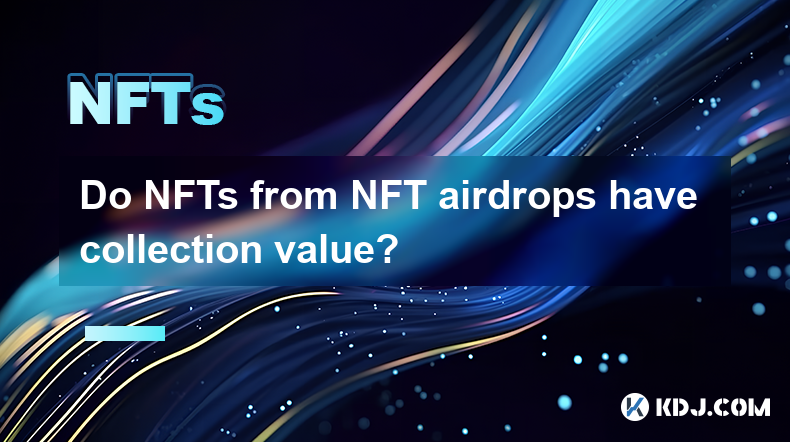
Do NFTs from NFT airdrops have collection value?
Apr 18,2025 at 11:49pm
NFTs, or non-fungible tokens, have become a significant part of the cryptocurrency ecosystem, and NFT airdrops are one way for projects to distribute these digital assets to their community. A common question that arises is whether NFTs received from airdrops have any collection value. To answer this question, we need to delve into various aspects of NF...
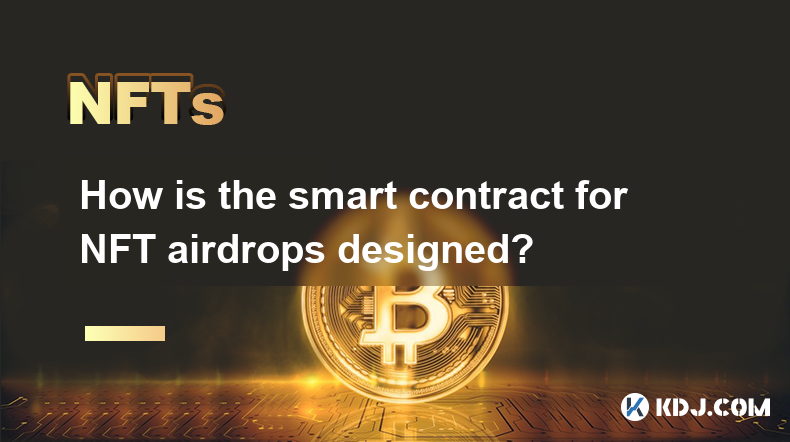
How is the smart contract for NFT airdrops designed?
Apr 18,2025 at 03:10am
The design of a smart contract for NFT airdrops is a complex process that requires careful consideration of various factors to ensure the airdrop is executed smoothly and securely. This article will delve into the intricacies of how such a smart contract is designed, focusing on key components, security measures, and the implementation process. Key Comp...
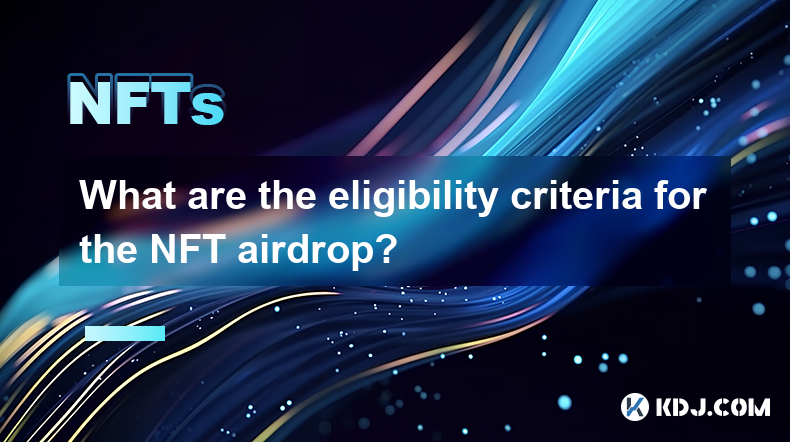
What are the eligibility criteria for the NFT airdrop?
Apr 17,2025 at 04:56pm
Understanding NFT AirdropsNFT airdrops are a popular method used by blockchain projects to distribute non-fungible tokens (NFTs) to their community members. These airdrops can serve various purposes, such as rewarding loyal users, promoting new projects, or increasing the visibility of existing ones. To participate in an NFT airdrop, individuals must me...

How to protect the copyright of artworks on NFT platforms?
Apr 19,2025 at 06:28am
The rise of Non-Fungible Tokens (NFTs) has revolutionized the way digital art is created, bought, and sold. As artists increasingly turn to NFT platforms to showcase and monetize their work, protecting the copyright of these artworks becomes a crucial concern. This article explores various strategies and tools that artists can use to safeguard their int...
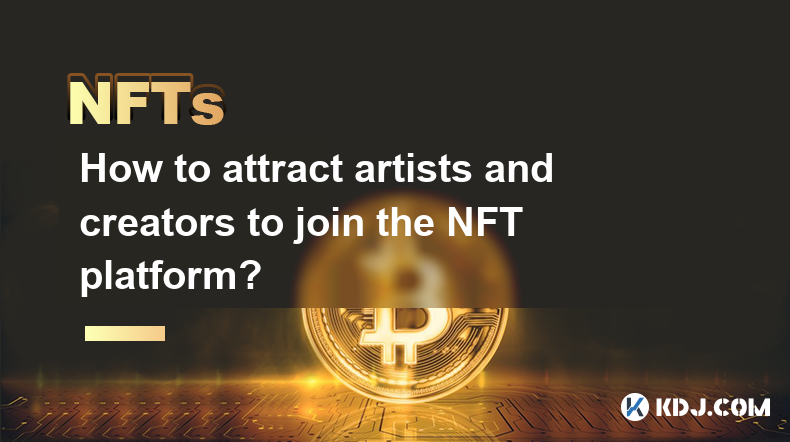
How to attract artists and creators to join the NFT platform?
Apr 18,2025 at 02:50pm
Attracting artists and creators to join an NFT platform is crucial for its success and growth. By understanding their needs and offering unique features, you can create a thriving community of digital artists and content creators. In this article, we will explore several strategies to entice artists and creators to join your NFT platform. Understanding ...

How to display and trade NFTs from NFT airdrops?
Apr 18,2025 at 04:42am
How to Display and Trade NFTs from NFT Airdrops? NFT airdrops have become a popular way for projects to distribute their tokens and engage with their community. If you've received NFTs through an airdrop, you might be wondering how to display and trade them. This article will guide you through the process step-by-step, ensuring you can showcase your NFT...

Do NFTs from NFT airdrops have collection value?
Apr 18,2025 at 11:49pm
NFTs, or non-fungible tokens, have become a significant part of the cryptocurrency ecosystem, and NFT airdrops are one way for projects to distribute these digital assets to their community. A common question that arises is whether NFTs received from airdrops have any collection value. To answer this question, we need to delve into various aspects of NF...

How is the smart contract for NFT airdrops designed?
Apr 18,2025 at 03:10am
The design of a smart contract for NFT airdrops is a complex process that requires careful consideration of various factors to ensure the airdrop is executed smoothly and securely. This article will delve into the intricacies of how such a smart contract is designed, focusing on key components, security measures, and the implementation process. Key Comp...

What are the eligibility criteria for the NFT airdrop?
Apr 17,2025 at 04:56pm
Understanding NFT AirdropsNFT airdrops are a popular method used by blockchain projects to distribute non-fungible tokens (NFTs) to their community members. These airdrops can serve various purposes, such as rewarding loyal users, promoting new projects, or increasing the visibility of existing ones. To participate in an NFT airdrop, individuals must me...

How to protect the copyright of artworks on NFT platforms?
Apr 19,2025 at 06:28am
The rise of Non-Fungible Tokens (NFTs) has revolutionized the way digital art is created, bought, and sold. As artists increasingly turn to NFT platforms to showcase and monetize their work, protecting the copyright of these artworks becomes a crucial concern. This article explores various strategies and tools that artists can use to safeguard their int...

How to attract artists and creators to join the NFT platform?
Apr 18,2025 at 02:50pm
Attracting artists and creators to join an NFT platform is crucial for its success and growth. By understanding their needs and offering unique features, you can create a thriving community of digital artists and content creators. In this article, we will explore several strategies to entice artists and creators to join your NFT platform. Understanding ...
See all articles
























































































